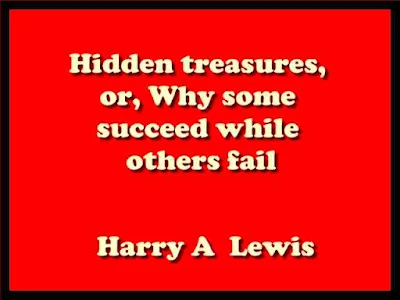Hidden treasures, or, Why some succeed while others fail
From the introduction:
succeed while others fail. This is a recognized fact, yet history tells us that seven-tenths of our most successful men began life poor. As our title indicates, we shall endeavour to show "why some succeed while others fail." Knowing that everybody desires success, and recognizing the old adage, "Example is the best of teachers," we have selected representative characters from the multitude of successful men who have climbed the ladder of success, beginning at the bottom round.
These we have folio wee from childhood to manhood, dwelling at length on the traits of character that have made them so rich and successful, believing that a careful study will convince all that the proverbial "luck" had little to do with it. On the contrary, one is taught those lessons of self-helpfulness and self-reliance which are so essential to success in life's struggles.
It is fearful to think how many of our young people are drifting without an aim in life, and do not comprehend that they owe mankind their best efforts. We are all familiar with the parable of the slothful servant who buried his talent— all may profit by his example.
To those who would succeed, we respectfully present this volume. Ill Every young man is now a sower of seed on the field of life.
The bright days of youth are the seed-time. Every thought of your intellect, every emotion of your heart, every word of your tongue, every principle you adopt, and every act you perform, is a seed, whose good or evil fruit will prove bliss or bane of your afterlife reader, it is a grave undertaking to write a book especially is it so in writing a treatise on success and failure, as we have attempted to do in the work we hereby present you. It is a solemn thing to give advice.
experience teaches that no one thing will please everybody; that men's censures are as various as their palates; that some are as deeply in love with vice as others are with virtue. Shall I then make myself the subject of every opinion, wise or weak?
Yes, I would rather hazard the censure of some than hinder the good of others. There need neither reasons to be given nor apologies to be made where the benefit of our fellow men is our aim. Henry Clay Trumbull says: "At no time in the world's history, probably, has there been so general interest in the biography as that which has been shown of late. Just here lies a weighty obligation upon those who write, and those who read, of the lives of men who have done something in the world. It is not enough for us to know
WHAT they have done; it belongs to us to discover the WHY of their works and ways, and to gain some personal benefit from the analysis of their successes and failures.
Why was this man great? What general intentions — what special traits led him to success? What ideal stood before him, and by what means did he seek to attain it? Or, on the other hand, what unworthy purpose, what lack of conscience and religious sense, what unsettled method and feeble endeavour stood in the way of the 'man of genius ' and his possible achievements ?" In this volume one sees the barefoot boy rise to the eminent statesman, the great millionaire, the honoured inventor. How was this accomplished?
We believe that a careful study of the different characters, in the light of the author's opinion of the characteristics essential to success, as shown in Department Fifth, will show why they succeeded. Let the reader follow each character separately, from childhood to manhood, noting carefully the different changes in the career of each and the motives which actuated and brought them about.
If this book shall serve to awaken dormant energies in ONE PERSON who might otherwise have failed, we shall feel abundantly repaid. Doubtless, there are others who are better qualified to write a treatise on such a subject; nevertheless, we have done our best, and this done, we have attained success.


